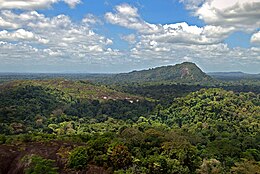The Central Suriname Nature Reserve (Dutch: Centraal Suriname Natuurreservaat (CSNR)) is a conservation unit in Suriname. It preserves an area of tropical rainforest. The reserve is in pristine condition.[1]
| UNESCO World Heritage Site | |
|---|---|
 View from the Voltzberg in the Central Suriname Nature Reserve | |
| Location | Sipaliwini District, Suriname |
| Criteria | Natural: (ix), (x) |
| Reference | 1017 |
| Inscription | 2000 (24th Session) |
| Area | 1,600,000 ha (4,000,000 acres) |
| Website | https://www.protectedplanet.net/central-suriname-nature-reserve-world-heritage-site |
| Coordinates | 4°0′N 56°30′W / 4.000°N 56.500°W |
History
editThe Central Suriname Nature Reserve was created in 1998 by Conservation International and the government of Suriname from the fusion of three existing nature reserves: Ralleighvallen, Tafelberg and Eilerts de Haan gebergte.[2] It was designated a UNESCO World Heritage Site in 2000 for its pristine tropical rainforest ecosystem.
The forest received material support from Microsoft co-founder Jeff Harbers.
Environment
editThe reserve is in the Guianan moist forests ecoregion.[3] It contains 16,000 square kilometres (6,200 sq mi) of both montane and lowland primary tropical forest including sections of the Guyana Highlands.
It is known for its rapids and bird species, including the Guiana Cock of the Rock (Rupicola rupicola).[4] Over 5,000 different plants have been identified, and large mammals like the jaguar, giant armadillo, and eight species of primates.[1] A research station is located at the foot of Voltzberg and the area is tourist attraction.[4]
Some of the most outstanding features in Central Suriname Nature Reserve are several granite domes – uplifted monoliths of granite rising high above the surrounding rainforest. Barren surface of dark-colored granite is exposed to impact of Sun thus creating unique xerophytic biotope which includes also endemic plant species. The best known granite dome is the 245 m high Voltzberg.[5]
Other attractions include the Julianatop (1,230 m), the highest mountain in Suriname, the Tafelberg (Table Mountain, 1,026 meters), the Hendriktop (908 m), the Van Stockumberg (360 m), and Duivelsei (Devil's Egg), a rock seemingly balanced on the edge of a mountain.[6]
The Eilerts de Haan Mountains are named for Johannes Gijsbert Willem Jacobus Eilerts de Haan, an explorer who died in Suriname's interior.[7]
References
edit- ^ a b "Central Suriname Nature Reserve". Unesco.org. Retrieved 27 May 2020.
- ^ "Central Suriname Nature Reserve". Tropical Ecology Assessment and Monitoring (TEAM) Network. Archived from the original on 20 May 2017. Retrieved 4 September 2015.
- ^ "Guianan moist forests", Global Species, Myers Enterprises II, archived from the original on 2017-03-17, retrieved 2017-04-03
- ^ a b Nature Reserve of Suriname Archived 2016-04-18 at the Wayback Machine Visit Suriname
- ^ "Voltzberg - granite dome in tropical forest". Wondermondo. Retrieved 5 June 2010.
- ^ "Hoogtelijn nummer 3 juni 2011". issuu. Retrieved 26 May 2020.
- ^ Albert Helman (1980). Het eind van de kaart (in Dutch). Amsterdam: De Arbeiderspers. p. 38. ISBN 902951907X.
External links
edit- Media related to Central Suriname Nature Reserve at Wikimedia Commons
- Surinamese Rainforest travel guide from Wikivoyage
- UNESCO site: Central Suriname Nature Reserve
- Conservation International site: Central Suriname Nature Reserve
- Stinasu site: Central Suriname Nature Reserve
